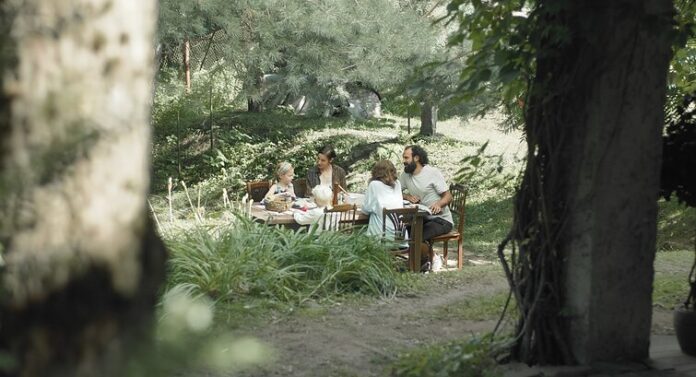
Remember to Blink (Per arti)
Mikko Toivanen, writing for LRT.lt, recently reported that among the many world premieres at this year’s Warsaw Film Festival (October 14–23) was a Lithuanian title: director Austėja Urbaitė’s feature-length debut Remember to Blink (Per arti).
A psychological family drama, Remember to Blink tells the story of a middle-class French couple, Jacqueline (Anne Azoulay) and Léon (Arthur Igual), who are in the process of adopting two siblings, a young boy and a girl from Lithuania. To help the children with their adjustment to the new environment, the couple also welcomes the twenty-something medical student Gabrielė (Dovilė Kundrotaitė), also from Lithuania, who helps with translation and childcare. The three adults’ first light-hearted encounter and its seemingly innocent nervous energy develops into uncontrollable mutual distrust between Jacqueline and Gabrielė, as a jealous rivalry for the children’s affections comes to dominate their relationship.
From early on, it becomes clear that this is a story about the two women, with Léon a likeable but sidelined, ultimately ineffectual presence in the developing drama. The film charts the shifting and complicated power dynamics between the two with great subtlety: there are clashing maternal instincts and suppressed traumas, but also the looming background of Europe’s internal inequalities – Jacqueline offhandedly remarks that Russians and Lithuanians “are the same” and insists on changing the children’s names into French ones. On the other hand, Gabrielė’s independence and future medical career contrast with the unease Jacqueline feels with her circumscribed life of a bourgeois housewife.
The ambivalence of language, whether Lithuanian or French, emerges as one of the film’s central themes: a means of communication but one with painfully sharp limits, it creates barriers as much as bridges between individuals, turning into a source of doubts and a tool of betrayal. It opens up a chasm of distrust between Jacqueline and Gabrielė, whom she suspects of dishonesty. But it is also an anchor: for the children, in the past they don’t fully understand the need to leave behind; and for Jacqueline, in the future family she desperately yearns for. Some of the best scenes in the film record fleeting wordless understandings and intimate, playful misunderstandings in the family-to-be, reminding us of the true breadth of communication beyond language.
Despite the tight focus on the interpersonal relationships the action taking place around the family home and its immediate environment, the film opens up through Julius Sičiūnas’s cinematography. Impressionistic natural vistas – though the film names no explicit location – are interspersed throughout, serving to ground the characters in the earth and water that surrounds them. There is a constant play of different scales, zooming in and out from nation to family to individual, and also in the nature scenes.
Urbaitė marshals the film’s wealth of suppressed passions with a deft hand, never giving into lurid excesses and steering well clear of kind of banal subplots. Gabrielė and Jacqueline retain their basic humanity and force the viewer to respond with recognition and empathy, aided by the compelling and nuanced performances from Kundrotaitė and Azoulay, oscillating between fierce and confused, confident and fragile in turn.
According to Toivanen, the film is a remarkably accomplished and assured debut from Urbaitė, all the more impressive for the international, multilingual scope of the production. It is a drama that feels simultaneously both big and small in all the best ways, an intimate and timeless story about normal, imperfect human beings but also one about today’s Europe.
It sounds like a film worth seeing – we will keep you informed about online screening.



























